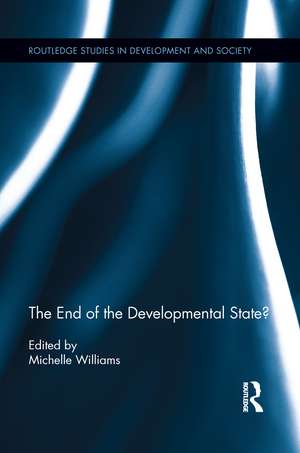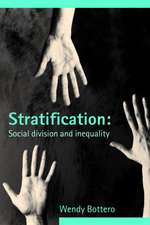The End of the Developmental State?: Routledge Studies in Development and Society
Editat de Michelle Williamsen Limba Engleză Paperback – 8 sep 2015
| Toate formatele și edițiile | Preț | Express |
|---|---|---|
| Paperback (1) | 413.18 lei 6-8 săpt. | |
| Taylor & Francis – 8 sep 2015 | 413.18 lei 6-8 săpt. | |
| Hardback (1) | 1058.43 lei 6-8 săpt. | |
| Taylor & Francis – 4 mar 2014 | 1058.43 lei 6-8 săpt. |
Din seria Routledge Studies in Development and Society
- 9%
 Preț: 1006.79 lei
Preț: 1006.79 lei -
 Preț: 298.75 lei
Preț: 298.75 lei -
 Preț: 311.41 lei
Preț: 311.41 lei -
 Preț: 353.18 lei
Preț: 353.18 lei -
 Preț: 431.73 lei
Preț: 431.73 lei -
 Preț: 434.63 lei
Preț: 434.63 lei - 28%
 Preț: 791.64 lei
Preț: 791.64 lei - 18%
 Preț: 1058.52 lei
Preț: 1058.52 lei -
 Preț: 411.42 lei
Preț: 411.42 lei - 26%
 Preț: 820.32 lei
Preț: 820.32 lei -
 Preț: 480.44 lei
Preț: 480.44 lei - 25%
 Preț: 823.81 lei
Preț: 823.81 lei - 18%
 Preț: 275.88 lei
Preț: 275.88 lei - 26%
 Preț: 876.21 lei
Preț: 876.21 lei - 18%
 Preț: 1064.98 lei
Preț: 1064.98 lei -
 Preț: 486.42 lei
Preț: 486.42 lei - 12%
 Preț: 314.79 lei
Preț: 314.79 lei - 18%
 Preț: 1069.23 lei
Preț: 1069.23 lei - 18%
 Preț: 1276.52 lei
Preț: 1276.52 lei - 18%
 Preț: 1059.48 lei
Preț: 1059.48 lei -
 Preț: 437.13 lei
Preț: 437.13 lei -
 Preț: 389.70 lei
Preț: 389.70 lei -
 Preț: 407.19 lei
Preț: 407.19 lei -
 Preț: 433.48 lei
Preț: 433.48 lei - 28%
 Preț: 823.17 lei
Preț: 823.17 lei -
 Preț: 366.46 lei
Preț: 366.46 lei - 18%
 Preț: 1059.48 lei
Preț: 1059.48 lei - 18%
 Preț: 1057.89 lei
Preț: 1057.89 lei - 18%
 Preț: 1108.37 lei
Preț: 1108.37 lei - 18%
 Preț: 1062.26 lei
Preț: 1062.26 lei -
 Preț: 446.37 lei
Preț: 446.37 lei - 16%
 Preț: 234.90 lei
Preț: 234.90 lei - 18%
 Preț: 1056.00 lei
Preț: 1056.00 lei -
 Preț: 432.29 lei
Preț: 432.29 lei - 25%
 Preț: 852.88 lei
Preț: 852.88 lei
Preț: 413.18 lei
Nou
Puncte Express: 620
Preț estimativ în valută:
79.07€ • 82.25$ • 65.28£
79.07€ • 82.25$ • 65.28£
Carte tipărită la comandă
Livrare economică 15-29 aprilie
Preluare comenzi: 021 569.72.76
Specificații
ISBN-13: 9781138953840
ISBN-10: 1138953849
Pagini: 258
Ilustrații: 3 black & white illustrations, 13 black & white tables, 3 black & white line drawings
Dimensiuni: 152 x 229 x 15 mm
Greutate: 0.38 kg
Ediția:1
Editura: Taylor & Francis
Colecția Routledge
Seria Routledge Studies in Development and Society
Locul publicării:Oxford, United Kingdom
ISBN-10: 1138953849
Pagini: 258
Ilustrații: 3 black & white illustrations, 13 black & white tables, 3 black & white line drawings
Dimensiuni: 152 x 229 x 15 mm
Greutate: 0.38 kg
Ediția:1
Editura: Taylor & Francis
Colecția Routledge
Seria Routledge Studies in Development and Society
Locul publicării:Oxford, United Kingdom
Public țintă
Postgraduate and UndergraduateCuprins
1. Rethinking the Developmental State in the Twenty-First Century Michelle Williams 2. The Developmental State in Retrospect and Prospect: Lessons from India and South Korea Vivek Chibber 3. Liberal Globalization, Capabilities, and the Developmental Network State in Ireland Seán Ó Riain 4. Developmental State in Transition: The State and the Development of Taiwan’s Biopharmaceutical Industry Jenn hwan Wang 5. The Enigma of Chinese Capitalism Ching Kwan Lee 6. South Africa’s Emergent "Green Developmental State"? Vishwas Satgar 7. Development in an Anti-Developmental State: The Market Politics of Renewable Energy in an Advanced Country and Its Implications for the Environment Barbara Harriss-White 8. The Brazilian Social Developmental State: A Progressive Agenda in a (Still) Conservative Political Society Celia Lessa Kerstenetzky 9. Politics of Democratic Decentralization and the Developmental State: A Study of the Kerala Experience Thomas Isaac 10. The Developmental State: Divergent Responses to Modern Economic Theory and the Twenty-First Century Economy Peter Evans
Recenzii
"What role can the developmental state play in addressing the complex challenges of the 21st century? Can economic competiveness be promoted along with inclusion, participation and sustainability? What are the capacities, institutions, social bases and political coalitions that can underwrite an effective state in a globalizing world? The End of the Developmental State? not only provides a new analytical framework to tackle these critical questions but does so through a rich collection of grounded and theoretically innovative papers that shed new light on key cases. Rarely has such a collection been more timely, or more certain, to animate the debate on development."
- Patrick Heller, Professor of Sociology, Brown University
"This remarkable collection forces a major re-think of the idea of 'the developmental state' against the background of neo-liberal triumphalism. Going beyond formulaic theoretical models of recent decades, it insists upon the relevance of revised and revitalised notions of the developmental state, not merely for the South, but for a Northern hemisphere presently thrust into capitalist crisis. An absolutely essential and innovative read for all scholars of development."
- Roger Southall, Professor Emeritus, Department of Sociology, University of the Witwatersrand
"Critical knowledge on developmental states has lagged far behind the seismic transformations in the global economy in recent years. These shifts have profoundly affected the political contours and economic fortunes of both old and aspiring developmental states. Contributors to The End of the Development State? probe the experiences of key contemporary developmental states within a tightly-woven comparative theoretical framework. The book illuminates the opportunities and obstacles facing these countries and makes a significant contribution to debates on the roles of states and markets in development."
- Gilbert Khadiagala, Professor of International Relations, University of the Witwatersrand
"Leading authorities from around the world examine the concrete challenges of state-led development. Everything you want to know about the developmental state and why its end might have arrived."
- Michael Burawoy, Professor of Sociology, University of California, Berkeley
- Patrick Heller, Professor of Sociology, Brown University
"This remarkable collection forces a major re-think of the idea of 'the developmental state' against the background of neo-liberal triumphalism. Going beyond formulaic theoretical models of recent decades, it insists upon the relevance of revised and revitalised notions of the developmental state, not merely for the South, but for a Northern hemisphere presently thrust into capitalist crisis. An absolutely essential and innovative read for all scholars of development."
- Roger Southall, Professor Emeritus, Department of Sociology, University of the Witwatersrand
"Critical knowledge on developmental states has lagged far behind the seismic transformations in the global economy in recent years. These shifts have profoundly affected the political contours and economic fortunes of both old and aspiring developmental states. Contributors to The End of the Development State? probe the experiences of key contemporary developmental states within a tightly-woven comparative theoretical framework. The book illuminates the opportunities and obstacles facing these countries and makes a significant contribution to debates on the roles of states and markets in development."
- Gilbert Khadiagala, Professor of International Relations, University of the Witwatersrand
"Leading authorities from around the world examine the concrete challenges of state-led development. Everything you want to know about the developmental state and why its end might have arrived."
- Michael Burawoy, Professor of Sociology, University of California, Berkeley
Descriere
This book brings together leading scholars of development to propose new theoretical understandings of the relationship between development and the state. Focusing on the role of the state in the developing and transitional economies of South Korea, Taiwan, Ireland, China, South Africa, Brazil and India, the volume outlines the major challenges - including global economic and ecological crises - and argues that these challenges require new forms of state interventions.














